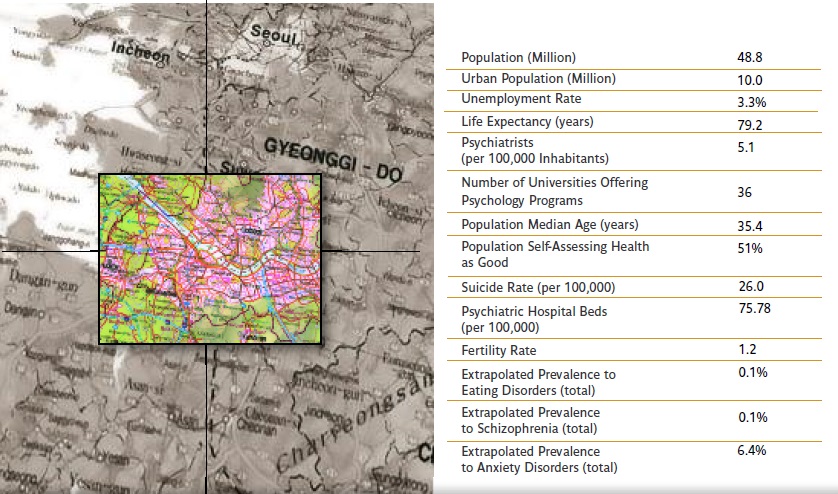➣ Emily Butcher
Currently experts in the mental health area in South Korea are focused on implementing changes that will result in heightened awareness and a broader scope of treatment options. Stigmatization of mental illness in Asian societies has made treatment difficult, as many individuals are hesitant to seek treatment and instead suffer in silence rather than bring shame to themselves and their families.
The stigma attached to various mental illnesses has resulted in a lack of a well-developed concept of mental illness, a common trait to most Asian nations. The treatment used in the West, of a recoverybased consumer-driven system, has not been implemented in South Korea. Without a solid understanding of different types of mental disease, the results have become apparent in disheartening statistics like a high suicide rate.
Troubling suicide rates
In 2008 South Korea had the highest suicide rate out of the 30 nations that make up the Organization for Economic Cooperation and Development (OECD). Between 1995 and 2005 the suicide rate more than doubled from 11.8 per 100,000 to 26.1 per 100,000. Currently, an average of 38 people commit suicide each day in South Korea, making it the fourth cause of death in the country.
One concern is the “glorification” of suicide committed by prominent celebrities such as popular actress Choi Jin-sil, who killed herself in 2008. Copycat suicides have been recorded throughout the country, such as five reenactments of a protestor, Chun Se, who set himself on fire and plunged 15 feet to his death to symbolically protest the beating deaths of student demonstrators. Surveys have shown that young people in South Korea view suicide as a right.
Everyday stress in a fast-paced society that pressures young people to become successful is trying as well. Suicide rates spike around midterm exams for high school students–a time in their life that may determine whether or not they will get into a prestigious university. Stress in the workplace, as well as competition among peers, has also been steadily rising, according to studies, and has resulted in a higher number of workers suffering from depression and mental illness.
To explain these numbers, the National Statistics Office, for example, blamed the bad economic climate resulting from the 1997 financial crisis. Social dislocations during a period of rabid urbanization in the 1980’s have also been given as a cause for increased incidence of mental illness and in 2005, the OECD cited the causes as changing and conflicting gender roles, domestic violence and economic hardship. Complications of actual causes are then magnified by the inattention paid to mental illness itself.
Rising Awareness
In 1985, when the Ministry of Health and Social Affairs estimated the number of people suffering from various forms of mental illness to be roughly 400,000, it made a decision to attack the problem with a large-scale program opening a number of new mental health care facilities and institutions. Any new hospital opening was now required to set aside a wing dedicated solely to psychiatric treatment.
The World Health Organization estimates suicide victims have a mental illness rate of 90 percent, usually in the form of depression or substance abuse. To address the need to decreases suicides in South Korea, there needs to be a greater dissemination of knowledge concerning mental illness–the fact that it is normal and exists throughout every walk of life, and that it is treatable. Currently, traditional forms of treatment are being supplemented by the application of new technologies such as VR.
CyberTherapy Applications in South Korea
For over a decade the Department of Biomedical Engineering at Hanyang University has been at the forefront for implementing new technologies to treat medical and psychological illnesses. The research done by Professor Sun Kim and his team has made the university one of the leading labs in the country employing VR and other advanced technologies for treatment, training and assessment.
To further understanding of the human brain mechanism, Professor Kim’s lab is focused on employing information and communications technology (ICT) research to psychiatric disorders and rehabilitation, in particular. The main body of research, conducted in a VR lab at Yonsei Medical School, focuses on neuroscience, rehabilitation and psychiatric disorders. An increase in public and private aid is rapidly improving research opportunities.
South Korea has been active in collaborating with countries around the world. This is encouraged by the fact that many specialists receive education overseas or have had experiences abroad. Currently, Professor Kim’s lab is involved in a joint project with City College of London. Although clinical studies in neuroscience and other areas may not always be readily compatible with foreign culture, participating in international projects enables researchers in South Korea to more easily adapt their studies to an international environment.
Kim believes that the future of ICT will consist of a more multimodal environment and the use of bidirectional media. He says, “Technology based on a better understanding of the human psyche will play a crucial role.” With increasing funding and a focus on intercultural research and international projects, South Korea is working to change the way that mental healthcare is both viewed and treated.
A Bright Future
For the first time in 15 years, The Annual CyberTherapy & CyberPsychology conference will be held in Asia. The conference will be hosted in Seoul on June 13-15, 2010. Topics to be discussed include uses of advanced technologies such as virtual reality simulations, videogames, telehealth, video-conferencing, the internet, robotics, brain computer interfaces, wearable computing, non-invasive physiological monitoring devices, in diagnosis, assessment, and prevention of mental and physical disorders. In addition, interactive media in training, education, rehabilitation, and therapeutic interventions will be explored. A second focus will also include how new technologies are influencing behavior and society through cyberadvertising, cyberfashion, and cyberstalking to name a few.
The time has come for change in the treatment of mental and physical illnesses in South Korea. Along with a prestigious conference bringing worldrenowned researchers from around the world, experts within its borders are taking steps to bring attention to topics that have long been considered taboo. To confront these problems head on, the first steps are awareness and acceptance of mental health disease. By acknowledging these problems and implementing tools to improve treatment, South Korea is well on the way to improving the overall mental health of its population.
Sources:
Personal communication with Professors Sun Kim and Jang-Han Lee, World Health Organization and countrystudies.us.
Emily Butcher
Managing Editor,
C&R Magazine
www.vrphobia.eu
ebutcher@vrphobia.com
About Brenda Wiederhold
President of Virtual Reality Medical Institute (VRMI) in Brussels, Belgium.
Executive VP Virtual Reality Medical Center (VRMC), based in San Diego and Los Angeles, California.
CEO of Interactive Media Institute a 501c3 non-profit
Clinical Instructor in Department of Psychiatry at UCSD
Founder of CyberPsychology, CyberTherapy, & Social Networking Conference
Visiting Professor at Catholic University Milan.









